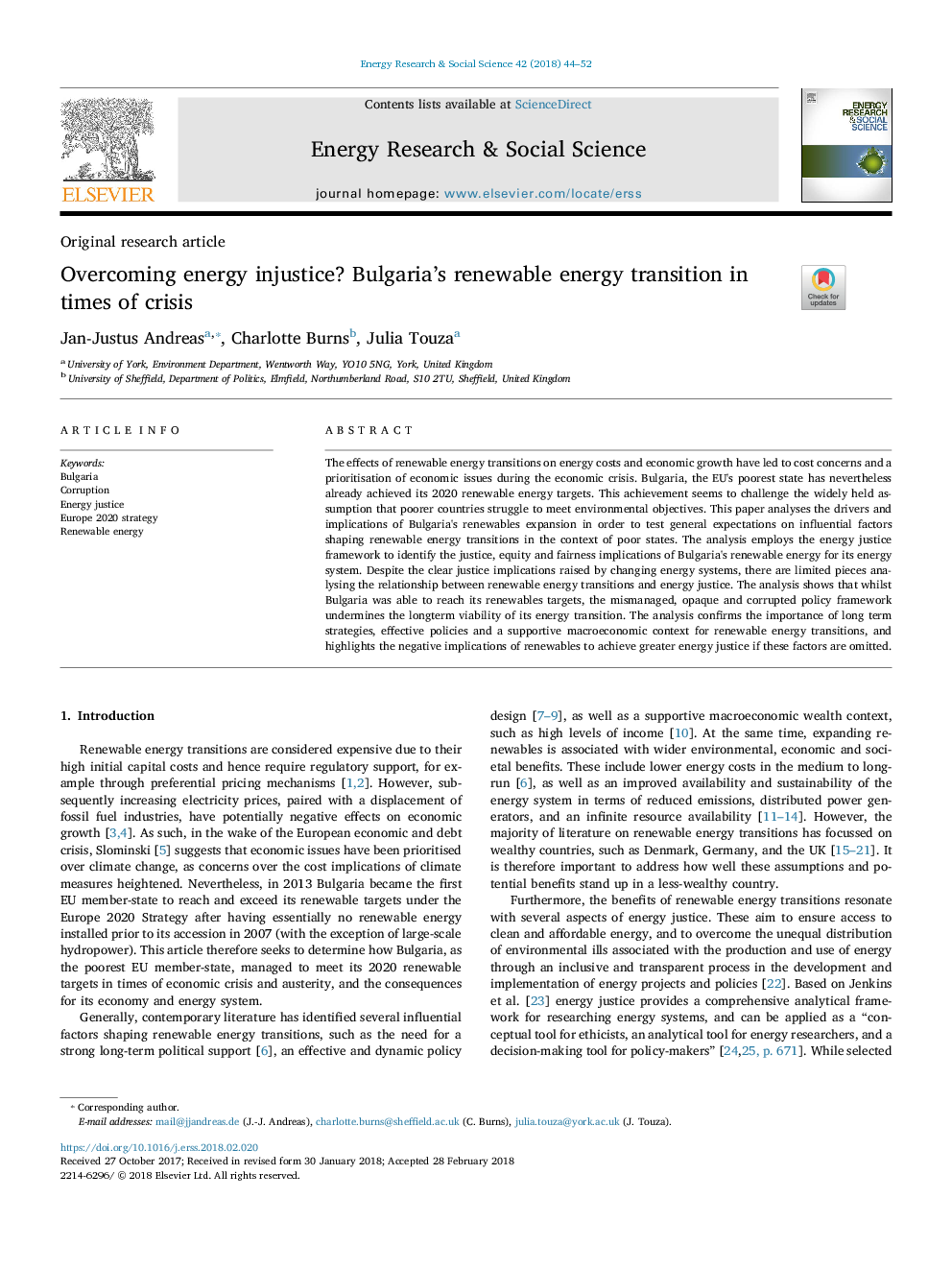ترجمه فارسی عنوان مقاله
غلبه بر بی عدالتی انرژی بلغارستان انتقال انرژی تجدید پذیر در زمان بحران
عنوان انگلیسی
Overcoming energy injustice? Bulgariaâs renewable energy transition in times of crisis
| کد مقاله | سال انتشار | تعداد صفحات مقاله انگلیسی |
|---|---|---|
| 141332 | 2018 | 9 صفحه PDF |
منبع

Publisher : Elsevier - Science Direct (الزویر - ساینس دایرکت)
Journal : Energy Research & Social Science, Volume 42, August 2018, Pages 44-52
ترجمه کلمات کلیدی
بلغارستان، فساد، عدالت انرژی، استراتژی اروپا 2020، انرژی تجدید پذیر،
کلمات کلیدی انگلیسی
Bulgaria; Corruption; Energy justice; Europe 2020 strategy; Renewable energy;
ترجمه چکیده
اثرات انتقال انرژی تجدید پذیر به هزینه های انرژی و رشد اقتصادی منجر به نگرانی های هزینه و اولویت بندی مسائل اقتصادی در طی بحران اقتصادی شده است. با این حال، بلغارستان، فقیرترین کشور اتحادیه اروپا، در حال حاضر اهداف انرژی تجدید پذیر 2020 خود را به دست آورده است. به نظر می رسد این دستاورد به برداشتی وسیع از این که کشورهای فقیرتر برای دستیابی به اهداف زیست محیطی تلاش می کنند، به چالش کشیده شده است. در این مقاله، ریشه ها و پیامدهای توسعه انرژی تجدیدپذیر بلغارستان به منظور بررسی انتظارات عمومی بر عوامل موثر در ایجاد انتقال انرژی های تجدیدپذیر در شرایط کشورهای فقیر، مورد تجزیه و تحلیل قرار گرفته است. تجزیه و تحلیل استفاده از چارچوب عدالت انرژی را برای شناسایی عدالت، عدالت و عدالت از انرژی تجدید پذیر بلغارستان برای سیستم انرژی خود استفاده می کند. علیرغم مفاد عدالت واضح که با تغییر سیستم های انرژی ایجاد می شود، قطعات محدودی وجود دارد که رابطه بین انتقال انرژی تجدید پذیر و عدالت انرژی را بررسی می کند. تجزیه و تحلیل نشان می دهد که در حالی که بلغارستان توانست به اهداف بازسازی خود دسترسی پیدا کند، چارچوب خط مشی ناکارآمد، مبهم و فاسد شده، زندگی طولانی مدت انتقال انرژی خود را تضعیف می کند. تجزیه و تحلیل تأیید اهمیت استراتژی های بلند مدت، سیاست های موثر و زمینه های حمایتی اقتصاد کلان برای انتقال انرژی های تجدید پذیر را تأیید می کند و پیامدهای منفی انرژی های تجدید پذیر را برای رسیدن به عدالت بیشتر انرژی، اگر این عوامل حذف شود، تأکید می کند.

